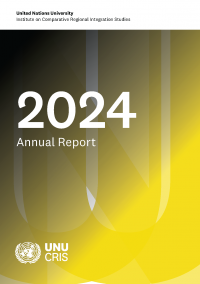
2024 illustrated, once again, the cost of non-cooperation, regionally and globally, for citizens worldwide. This cost can be calculated by the lost lives of thousands of people in armed conflicts, and by the cost in terms of poverty and quality of life of multiples of these numbers. It only strengthens our conviction that in the interdependent world we live, there is no alternative for (horizontal) multilateral and regional cooperation and (vertical) multi-level governance.
How this can be done by taking regional context into account, what can be learned from success stories and failures, how impact of regional policies can be assessed, how supranational and sub-national regions can play a role in multi-level governance contexts, are all questions that are at the core of the research and capacity-building activities at UNU-CRIS, with its unique comparative perspective, pluralistic character, and global mandate.
In 2024, UNU-CRIS has further consolidated its activities and produced impactful output, of which you will find a summary here in this Annual Report. The highlights include: the 1st edition of our Doctoral School on Asian and Comparative Regionalism, the co-organisation of high-level interregional dialogues (EU-LAC, EU-AU), our presence at the 2024 COPs, 5 PhD defences, to name just a few.
We have also started to roll-out the new UNU strategy to increase our presence worldwide. MoUs were signed (or are being negotiated) with UN-ECLAC and universities in Latin America, Africa and Asia. Our aim is to upgrade these collaborations to UNU hubs soon.
2024 was also a record year: we have never had so many visitors (22 visiting researchers, 29 interns), and so many associate research fellows (45). External research funding has never been higher since the introduction of the new governance structure in 2016 (67% of core funding in 2024). This all points to the unaltered relevance of our work.
Finally, the RIKS and Economic Interactions clusters, which already worked closely together, have merged into the Economic and Political Interactions (EPI) cluster. The cluster will continue its work on the economic aspects of regionalism, the impact and effectiveness of regional policies and institutions, and will continue its transversal function within UNU-CRIS of data collection and quantitative methods knowledge centre, as well as the maintenance of the RIKS platform.
Philippe De Lombaerde
Director of the United Nations University Institute on Comparative Regional Integration Studies
